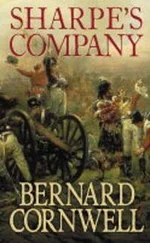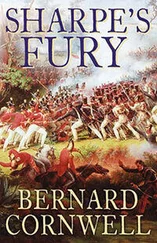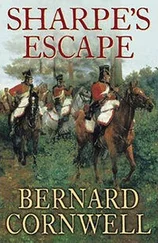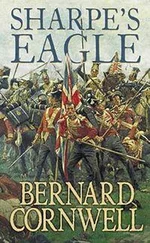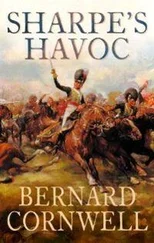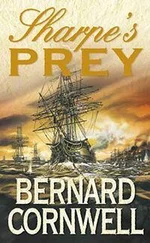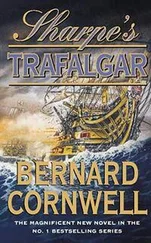“I insist,” Ducos said, “that Major Sharpe is handed over to my department.”
“You can have the bastard.” Calvet looked back at the map and, with a sudden gesture, extended the larger arrow straight into the courtyard. “Tell the men that the enemy is low on ammunition. Tell them we killed half the bastards today, tell them there’s women and wine inside. Tell them there’s a medal each for the first ten men inside.” Calvet looked at his scribbled arrow and remembered the sheer volume of fire that the goddamns had poured into his column. He remembered men screaming, clawing at their eyes, and he remembered the trails of blood across the fort’s esplanade.
His men would remember just as clearly, and defeated men would be nervous about a renewed attack. Calvet needed something else, some new factor to change the second assault, and, with sudden energy, he scribbled marks in the sand-dunes by the channel. “If we put two twelves there,” he asked the artillery colonel, “they can rake the breach till the last minute?”
The artillery colonel was already doubtful of his guns’ ability to bring down an archway in just a few hours. Even huge siege guns, twice the size of his twelve-pounders, could take weeks to shatter a well-built rampart, and now Calvet wanted to take two of the guns away from the breaching battery. “And even if I moved two guns, sir, how do we protect the crews from the Riflemen?” Calvet wanted the two guns placed within two hundred yards of the ramparts.
Calvet grunted an acknowledgement. The closest howitzer fired, thumping the hovel with a punch of sound and air, and the beat of the great gun’s firing jarred a scrap of reed from the thatched roof. It fell on to Calvet’s map, landing on the channel. “If I had a ship there,” Calvet mused aloud, “it would win the day. But I don’t have a ship, so your two gun-crews will have to take their dead and keep firing.” He stared belligerently at the artilleryman.
“But you can have a ship.” Ducos spoke softly from his place beside the fire.
Calvet swung round to face the small major. “A ship?”
“There is an American,” Ducos said, “and he has a ship.”
“Then fetch him!” Calvet crossed out his new gun positions and drew the outline of a ship around the fleck of straw. “Fetch him, Ducos! And tell our ally he has to fight! Fetch him!”
Killick, summoned from Gujan, leaned over the General’s map table. He saw that Calvet wanted the southern wall bombarded. A ship, moored off the fort’s south-western angle, could fire till the very final second of an assault, long after the twelve-pounders in the mill would have been forced into silence for fear of hitting their own attacking column. The Thuella’s gunfire, coming at right-angles to the line of attack and aimed at the breach, would force the defenders away from that vulnerable point. Such a floating battery, Killick saw, would be a guarantee of victory to demoralized men. The American nodded. “It could be done.”
“At dawn?” Calvet asked.
Killick drew on his cigar. “It could be done, but not by me. I have taken an oath not to fight against the British.” There was silence, except for the sudden percussion of an howitzer that shook more dust free from the roof. Killick shrugged. “I’m sorry, gentlemen.”
“An oath?” Ducos’ voice was sharp with scorn.
“An oath,” Killick repeated. “Major Sharpe spared my life in return for that oath,” the American grinned, “and as the promise wasn’t made to a lady, it has to be honoured.”
Killick’s levity stung Ducos. “One does not keep oaths to savages. You, of all people, should know that.”
“Is that why you didn’t send me the copper sheeting?” Killick stared with dislike at Ducos. “Don’t lecture me, Major, about keeping promises.”
The copper sheeting had never come, but the schooner had been patched with coffin-elm and smeared with pitch. The job had been done faster than Cornelius Killick had dared hope.
The topmasts had been swayed up on tackles and lashed into place. Tangled shrouds had been sorted, cleated, and winched home. The Thuella, that had given the appearance of a dead and burning ship, lived again.
That very morning, as Frenchmen died in a fort’s gateway, anchors had been laid in the Gujan channel and, at high tide, the windlasses had hauled the empty hull off the mud. The Thuella had slipped into the water. In just a few seconds, an ungainly and grounded hulk had become a slender craft shivering to the touch of wind and waves. Her figurehead had been bolted into place. Meat and water and flour and bread and wine and biscuit and onions and more wine were taken aboard. The carpenter had sounded the bilges and, though some water was leaking through the repaired hull, he had declared the pumps could take care of the seepage.
“So, yes,” Killick now said, “the Thuella can be moored in the channel tomorrow morning, General, but it can’t fire a shot. I’ve taken an oath.”
Calvet, eager to harness the Thuella’s firepower, smiled. “Major Sharpe forfeited all honour, Captain Killick, when he chose to use quicklime against my troops. You may therefore consider yourself released from any undertakings of honour made with him.”
Killick, who had already expressed profound disgust at the use of quicklime, now shook his head. “I think I’m the best judge of my own honour, General.”
“You are a civilian,” Pierre Ducos, despite his small size, was endowed with a voice of unusual authority, ”and by your own account, Mr Killick, you have trafficked with the enemy. I presume you do not wish to undergo a long period of questioning at the hands of French authorities?“ Killick said nothing. The other French officers, even Calvet, were made uneasy by the threat, while Ducos, sensing that he had an advantage over the tall, handsome American, smiled. ”If Mr Killick does not offer some satisfactory explanation of his actions on French soil then I will use my authority to seek such an explanation.“
“My explanation…” Killick began.
Ducos interrupted him. “Your explanations are best given with grapeshot at dawn. Do I have your oath, Mr Killick, that you will be there? Or must I investigate you?”
The American’s quick temper flared. “I was captured, you little bastard, because I volunteered to defend your bloody fort.”
“And you lost not a man killed,” Ducos said chillingly, “and you were released within hours. I think those circumstances deserve investigation.”
Killick looked to Calvet, but saw that the French general was powerless to countermand the thin, bespectacled major. The American shrugged. “I cannot be there at dawn.”
“Then I will order your arrest,” Ducos said.
“I can’t be there at dawn, you bastard,” Killick growled, “because the tide won’t serve. I’ve got twenty miles of shallow water to negotiate. Unless you can threaten God into a premature high-tide?” He stared defiance at Ducos, then looked at the map. “One hour after dawn. No sooner.”
“But one hour after dawn,” Ducos was relentless in victory, “you will be moored off the fortress and bombarding the walls with grapeshot?” He had seen a flicker of hope on Killick’s face, and knew the American was thinking that, once on board his ship, Pierre Ducos would be powerless to impose his will. “I want your promise, Mr Killick, your oath.” Ducos had seized a piece of paper and, using the general’s charcoal, scrawled big letters that formed a confession that Killick had unlawfully entered into a treaty with the enemy, and a promise that, as recompense, the Thuella would bombard the fortress until surrender or victory ended the morning’s engagement. He thrust the paper forward. “Well?”
Killick knew that if he did not sign Ducos would use his authority to detain him. Liam Docherty would not sail without Killick and the Thuella would stay in the Bassin, a hostage to Ducos’ whim. In the embarrassed silence the American took the charcoal and scrawled his name. “One hour after dawn.”
Читать дальше

